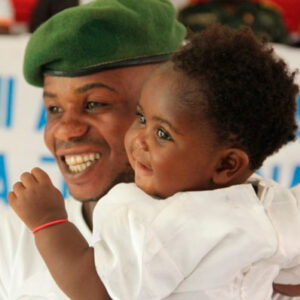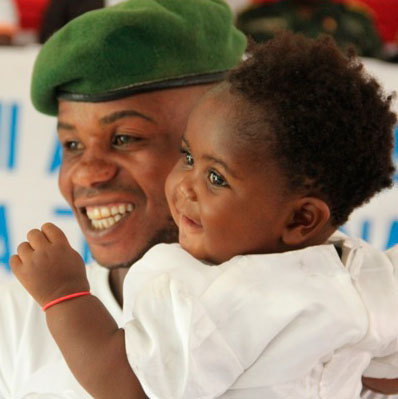 Equimundo’s team in Democratic Republic of the Congo (DRC), the Living Peace Institute, held three celebrations to conclude its second round of Living Peace groups in North and South Kivu in December 2015. Working with Institut Supérieur du Lac (ISL), HEAL Africa, and Benenfance, the Living Peace Institute aims to prevent violence in post-conflict settings through evidence-based psychosocial support and group education for men and their partners, coupled with community campaigns and outreach.
Equimundo’s team in Democratic Republic of the Congo (DRC), the Living Peace Institute, held three celebrations to conclude its second round of Living Peace groups in North and South Kivu in December 2015. Working with Institut Supérieur du Lac (ISL), HEAL Africa, and Benenfance, the Living Peace Institute aims to prevent violence in post-conflict settings through evidence-based psychosocial support and group education for men and their partners, coupled with community campaigns and outreach.
In the initiative’s second round of groups, the Living Peace Institute and its partners worked with various communities to address and prevent gender-based violence. ISL worked with members of the military and the police throughout North and South Kivu; HEAL Africa engaged men in Goma whose wives were survivors of sexual and gender-based violence; and Benenfance provided group therapy for the civilian populations of Masisi and Beni.
More than 1,000 Living Peace participants and their wives celebrated the groups’ closing celebrations, which were also attended by community leaders, political authorities, military and police commanders, and the provincial ministers of gender from North and South Kivu.
Each of the ceremonies began with a parade of participants and their wives wearing white T-shirts that read “Wa baba wa amani” (in Swahili) or “Mobali ya mpiko” (in Lingala), which means “Fathers of Peace.” The parades were accompanied by police, military, and civilian marching bands.
The celebrations centered on performances and stories of change from Living Peace participants and their wives. Many women shared that their husbands had used different forms of violence against them, including threatening and beating them, before participating in the Living Peace groups. After joining the groups, however, these men learned and adopted positive strategies to deal with trauma and eliminate their use violence. Participants and families spoke of the positive impact that Living Peace had made on their own lives and on their relationships with others. They thanked the program’s coordinators and facilitators, and they requested that the Living Peace model be extended throughout other provinces in DRC.
In the Living Peace groups, participants learn to recognize the damaging physical and psychological impacts of their use of violence on women, on other men, and on their families. They commit to live in harmony with their wives and their children, as well as with the entire community. The groups use a three-pronged approach – which includes intervention, prevention, and support – to address past trauma and to encourage change. Participants join 15 sessions as part of the program, and many continue to meet and support each other after the formal program has ended.
During the celebrations, the provincial ministers of gender, political authorities, and police and military commanders all expressed their gratitude for Living Peace’s ability to transform attitudes and behaviors and to promote positive change; they committed to supporting further collaborations between the Living Peace Institute and their institutions.
Local and national media covered the Living Peace community celebrations in French and Swahili. Outlets included RTNC, RTCT, Hope Channel TV, Radio Okapi, Sauti Ya injili, and Radio Kamanyola.
